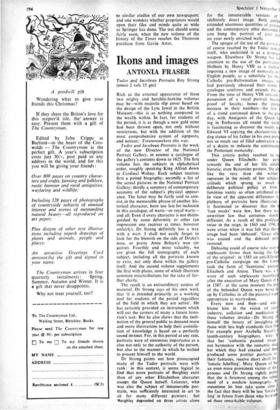Axel grinding
DONALD McLACHAN
Press Power: A Study of Axel Springer Hans Dieter Midler (Macdonald 42s)
Axel Springer, who controls an astonish- ingly large slice of the West German press, is subject to changes of mind and policy, From being pro-Khruschev he became. when rebuffed, strongly anti-Ulbricht; from being pro-Adenauer and CDU might he, conceivably, give the new Brandt govern- ment the kind of fair wind the Tories gave Wilson for the hundred days? It seems unlikely; but, if he did, would the radicals, the students and the liberal intelligentsia in Germany cease to attack his control of forty per cent of total editions of the dailies, eighty per cent of the big regional press, and ninety per cent of the Sundays? In other words is his monopoly objected to on principle, or because its policy is nationalist, petit bourgeois, anti-intellectual and demagogic?
The author of this book, a university lecturer, would object on principle and along well-known lines of argument. I am less certain about those who tried to wreck the Springer Press two years ago by attack- ing vehicles and offices and by ringing up the small ads agencies from public kiosks and then leaving the receiver dangling. All the two parties have in common would be a hatred for Bild-Zeitung (read by fifteen million people daily) because it caters for the lazy-minded, the semi-educated and the low tQs with the same brilliance and energy as our Mirror; and also a wish that bie Welt were a sort of Guardian. For Germany lacks a radical, working class paper of tho Mirror level and a national left-wing daily. It is really more serious that they should be missing than that Springer is so power- ful.
The tone of the book is fair to Springer personally; the results of his power may be sinister but there is no suggestion that his motives are. The author has done several years' work on his subject, with the help of the newspaper organisation itself; and so far as I know its main conclusions, in the German edition of last year, have not been seriously challenged. But Herr Mueller starts from the Standpunkt that newspapers should circulate 'social truths', a purpose which is really beyond the scope of any popular, mass-circulation tabloid like
He dislikes the idea that people should actually enjoy their daily paper, be so fortified or stimulated by it that when the editor takes a certain political line they will -blindly. -follow it. He does not realise that the triviality of . the. reader's interest interacts with the triviality of the journalist's purposes. I suspect her would like to see in Germany more papers of the semi-popular type, the very kind which are now facing falling circulations in Britain.
Of the criticisms, the .one that impressed me most had to do with the campaign waged : agaigst German television by Springer's papers as part of his effort to get, into the game himself. That seems to have been unscrupulous to a degree. I found it hard to follow the financial twists and turns as the empire was built up, and I would not recommend the book to people who- do not know Germany and .cannot read its newspapers. But it points the way to similar studies of our own newspapers; and one wonders whether proprietors would open their files and minds quite as wide as Springer has done. The test should come fairly soon, when the new volume of the history of the Times reaches the Thomson purchase from Gavin Astor.















































 Previous page
Previous page